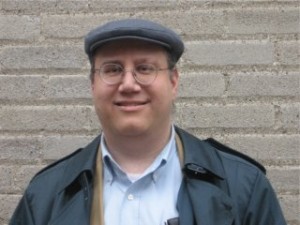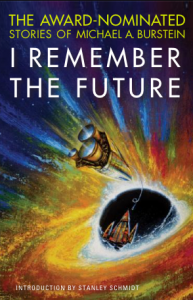An Interview with Michael A. Burstein
Michael A. Burstein, winner of the 1997 Campbell Award for Best New Writer, has earned ten Hugo nominations and three Nebula nominations for his short fiction, which appears mostly in Analog. Burstein lives with his wife Nomi in the town of Brookline, Massachusetts, where he is an elected Town Meeting Member and Library Trustee. When not writing, he edits middle and high school Science textbooks. He has two degrees in Physics and attended the Clarion Workshop. The story that appears here is quite unlike the hard SF that he’s known for, although in my opinion, it is also hard SF in its own way.
1) I know that you went to Clarion. We also were in a writer’s workshop together years ago, and you were involved in online writer’s workshops. Can you say something about the time when you were getting started? Did you write much before you became active in the writer’s community? What kinds of things did you find helpful or unhelpful?
Trying to define when I was “getting started” is a little tricky. As a child, I was always interested in being a writer, and like many other people I was submitting stories to the science fiction magazines when I was twelve years old. But I suppose I didn’t become truly devoted to trying to get published until I was in graduate school in my early twenties. I can’t remember how many stories I wrote and how many rejections I piled up, but it was a significant number. I read a lot of books on writing while I was in graduate school, but didn’t really get involved in writing workshops until after I had left. I was in New York City for two years afterward, and I was briefly part of a group there called Reference Frame.
Then, as you know, I attended Clarion in 1994 and joined Critical Mass in 1995. (I also maintain an affiliation with Critters.) I’ve found writer’s workshops to be very helpful, and I always recommend them to newer writers. Workshops give writers a chance to look at their stories anew, and see what works and what doesn’t. You do need to be able to handle critique, but I imagine if you’re joining a workshop, that’s what you’re expecting.
2) Tell me about the first thing you ever wrote? How old were you when you first wanted to write?
It’s hard to recall the first thing I ever wrote, although I do have memories of taping a bunch of loose-leaf papers together to resemble a scroll, and then writing some sort of Biblical-style story on the scroll.
The first thing I ever submitted was a description of a new alien race to the magazine devoted to the role-playing game Traveller. I must have been about ten or eleven years old at the time. I got back a form rejection note, but the line asking me to consider them for future submissions had been underlined in blue pen.
My first publication, as far as I have been able to determine, was a letter in the Jewish kids’ magazine World Over, published in their October 10, 1980 issue.
3) Do you have any creative projects outside of writing? (music, art, etc)
For about a year or so, my wife and I took private cartooning lessons from an artist named Raul Gonzalez. Raul is a great teacher, and we did our best to be good students. The main reason we took the lessons was my love of comic books; I wanted to see how much I could learn about cartooning myself.
What I discovered was that I probably could become a decent enough cartoonist, if I devote as much time to cartooning as I have to writing. Since I’m not sure that I’d have the time to do that, we eventually faded away from the lessons. However, taking the lessons taught me to appreciate comic book art much more. I’m now fascinated with how intricate an artist can make a scene with so few lines.
4) What are your favorite/least favorite aspects of sf fandom?
My favorite aspect of fandom is the camaraderie.
My least favorite aspect is the way that people cling to their own view of something in the genre and often dismiss everything else.
For example, recently Frederik Pohl was quoted as saying some dismissive words about fantasy as opposed to science fiction. One fan I know complained online about Pohl’s comments and attitude, and then said something like “But I don’t read hard science fiction, as hard SF writers can’t write anything good.” She didn’t seem to see that she was committing the same error that Pohl was.
5) What are you reading now?
A lot of nonfiction, actually. I’ve just finished “In Her Sights” by Kate Brennan, a true story about a woman who has been stalked for much of her life. I’m also reading “Superheroes!” by Roz Kaveney, a nonfiction look at the superhero genre. I finished “Fire-Breathing Liberal” by Rep. Robert Wexler, and I’m in the middle of Ken Miller’s “Only a Theory” about evolution.
In fiction, I’m reading “Marsbound” by Joe Haldeman, “Wake” by Robert J. Sawyer (in Analog), “The Grift” by Debra Ginsberg, and I’m looking forward to Paul Levinson’s new novel.
I just read “Fifty-to-One” by my high school friend Charles Ardai, and enjoyed it immensely.
In comics, I read three of the four volumes of “Alias” by Brian Michael Bendis, but I skipped volume one because I couldn’t find it (the others I got from the library). If anyone out there wants to lend me volume one, I’d appreciate it. (I wish they’d bring the hardcover collection back into print.)
And I’m probably leaving out a lot that’s not coming to mind at the moment. I’ve been trying to keep my Good Reads webpage up to date, so maybe you should send people there…
6) What are your current writing projects?
Well, let’s see… I have three writers with whom I’m supposed to be collaborating on short stories, two other short stories I’m working on for Analog, and (as always) a novel I’m trying to commit to paper.
7) What is your latest big discovery in your life? (music, book, pastime, food, whatever…)
I just finished a Certificate in Publishing program at Boston University, and I have learned a tremendous amount about the business side of publishing. I would strongly recommend that any writer take courses on book marketing and production, as it’ll make you a better promoter of your own books.
8) Lately, I’ve been thinking a lot about fallow periods. Have you had a period in your life when you didn’t or couldn’t create? What do you think caused it? What kind of effect did it have on your later work?
My mom died in January 2007, and right afterwards I found myself having difficulty writing. In some ways, I’m still recovering from that.
9) I’m sorry to hear about your mom, Michael. This story was a real departure for you. I know that other venues might not consider this science fiction. To me, this story is essential SF in that it is fiction about science even if the sensibility is more mainstream. What do you think?
This may sound odd, but I’m not sure if I could classify this story as science fiction, as much as I want to. You’re right that it’s a real departure for me; I was aiming for something a little more “slipstream” than my usual work. I think I succeeded, but I might have to leave that for others to judge.
Thanks for taking the time to talk to us, Michael. I’d like to add that this story is a perfect example of what I’m looking for in this project in the way that it blends different styles together so seamlessly.
You can learn more about Michael at his website or his blog.
Those who have been following Michael’s career will be pleased to hear that he has a book of short stories coming out soon. It’s entitled I Remember the Future and it will be published by Apex Publications on November 1st. It will contain all of Michael’s Hugo and Nebula nominated stories. 
One Response to “An Interview with Michael A. Burstein”
Leave a Reply
You must be logged in to post a comment.



[…] Albright has posted her interview of Michael Burstein at her blog, Polu Texni. She reminds everyone that I Remember the Future, a collection of […]